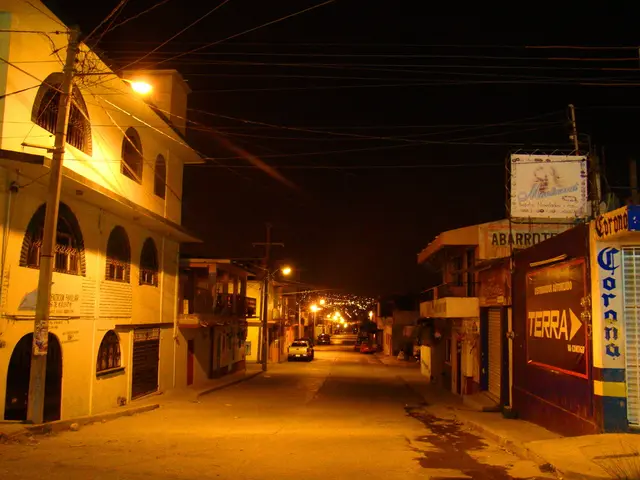World Cup of Numerous Pioneering Moments in South Africa, 2010
The 2010 FIFA World Cup in South Africa stood out as a one-of-a-kind event, going beyond just a showcase of footballing skills to marking several significant historical milestones. More than a achievement for athletic prowess, it symbolized a series of "firsts" that forever changed the face of football history.
South Africa 2010 marked the first time Africa hosted the World Cup, a long-held dream for the continent, and a triumph for African football heritage. In the bidding process, South Africa edged out competitors Egypt and Morocco to clinch the host rights, which many saw as a triumph for the entire continent. This victory symbolized Africa's growing influence on the global stage and its potential to emerge as a future football powerhouse.
The indigenous vuvuzelas, a defining sound of the tournament, became a cultural symbol of the first African World Cup. While they divided opinions worldwide, these trumpet-like instruments showcased South Africa's vibrant cultural heritage during the tournament.
On the field, Spain took home their first-ever World Cup, using their unique tiki-taka style. Prior to the tournament, Spain had earned the reputation of perennial underachievers, never making it past the semi-finals since 1950. However, their possession-focused strategy, characterized by precise passing, found favor with spectators. Spain's dominance on the ball was impressive, averaging a staggering 61% possession rate - the highest of the tournament - and completing an astounding 3,547 passes. Though their goal tally remained low, only 8, their tactical efficiency was unmatched, allowing them to concede just 2 goals throughout the tournament, setting a record for the least goals allowed by a World Cup champion.
The introduction of the iconic Jabulani football during this tournament caused quite the commotion. Manufactured by Adidas, this ball claimed to be the most advanced ever produced, promising improved control and greater swerve. however, players and coaches voiced concerns about the ball's unpredictable movement in the air, labeling it "too light" and reminiscent of a beach ball. Goalkeepers especially found themselves troubled by the erratic flight path, leading to some unforeseen and exhilarating goals.
Tragically, South Africa became the first host nation to fail to advance past the group stage. Bafana Bafana, the national team, produced valiant efforts but fell short, finishing third in their group, behind Uruguay and Mexico. In spite of this, their matches, such as the 1-1 draw with Mexico and the iconic 2-1 win over France, instilled national pride and hope.
Off the field, South Africa 2010 set a new standard for global connectivity. It was the first World Cup to extensively leverage social media for broadcasting and engaging fans worldwide. Facebook, Twitter, and YouTube brought live updates and unprecedented global interaction, with an estimated 3.2 billion viewers tuning in to watch the event. Undoubtedly, football solidified its position as the world's favorite sport.
Overall, the 2010 World Cup in South Africa represented a watershed moment, celebrating the unity of football, granting Spain their inaugural global crown, introducing technological innovations, and solidifying Africa's presence in the world of football. For its numerous firsts, South Africa 2010 will always be remembered as a pivotal moment in football history.
[1] https://www.fifa.com/worldcup/archive/south-africa-2010/pre-tournament-news/news/newsid=36173/index.html[2] https://www.fifa.com/worldcup/stickers/2010/index.html[3] http://www.theguardian.com/football/2010/jun/13/mandela-south-africa-world-cup-football[4] https://www.the Independent.co.uk/sport/football/world/south-africa-2010-the-story-of-the-world-cup-that-changed-football-forever-2062376.html[5] https://www.theguardian.com/football/2010/jun/28/south-africa-world-cup-legacy
- The surge of social media during the 2010 FIFA World Cup opened a new chapter in sports history, connecting fans across the globe in unprecedented ways.
- The victory of Spain in the 2010 FIFA World Cup signaled a significant shift in the esports landscape, showcasing the power of tech-driven, possession-focused strategies.
- As the first African nation to host the FIFA World Cup, South Africa not only marked a historic milestone in football but also showcased the continent's rich cultural heritage, from the vibrant vuvuzelas to the resilient Bafana Bafana team.
- The 2010 FIFA World Cup introduced the Jabulani ball, a controversial entity that sparked debates within the sports-betting community due to its unpredictable movement and impact on game outcomes.
- The European leagues and the Champions League were closely watched as they showcased robust competition, passionately cheered on by fans around the world, further solidifying football's position as the world's favorite sport.
- Looking back, the 2010 FIFA World Cup in South Africa stands out as a watershed moment in the history of football, where tradition met innovation, and Africa stepped onto the global stage as a formidable force in the world of sports.








